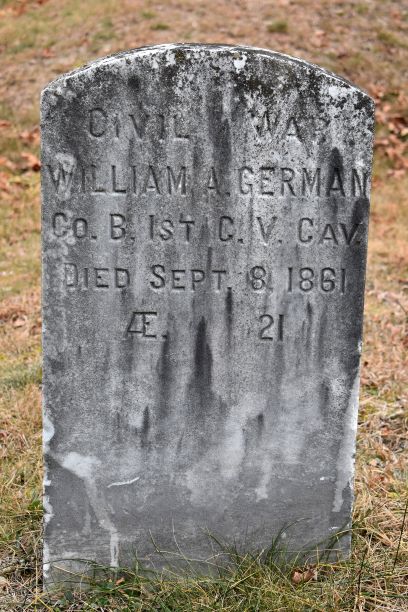
YOUR SILENT NEIGHBORS, William A. German, Civil War Soldier
by David K. Leff
Town Poet Laureate and Deputy Town Historian
In 1861, William A. German (1840-1861) was among the first contingent of Civil War volunteers to leave Canton in a parade down Main and River Streets attended by a wildly cheering crowd. He served in Company B of the First Cavalry. On September 8 of that year, he became the town’s first casualty, killed in a train derailment in Cockeysville, Maryland, not far from Baltimore.
On the day of his death, German boarded a southbound train heading to Washington, D.C. with 480 other cavalry soldiers. Traveling about 20 miles per hour as they neared a place called Spark’s Station, an axle on one of the cars broke at a curve. The “track was torn asunder,” according to a September 10 New York Times report, “precipitating the entire train, one car upon another, smashing them almost literally to atoms.” Fourteen soldiers were killed or seriously injured.
After the accident, engineer Frank Guebrick uncoupled the engine and went back to Cockeysville to report on what happened. Some of the soldiers suspected sabotage, and claimed the engineer was out to murder the entire regiment. They said he was reluctant to find cars to move the troops to Baltimore, and that they were forced to take possession of an engine. They then compelled the engineer to drive the train under armed guard. “I’ll run them to Baltimore or hell by 4 o’clock,” the soldiers claimed he said, a charge that was denied. The railroad stated that Guebrick was “one of their most trusty and skillful men.”
The dead and injured were brought to a hospital established in Baltimore’s National Hotel. The engineer and fireman were arrested and jailed pending an investigation. Railroad officials exonerated their employees. Some of the soldiers asserted that the train was traveling at 60 miles an hour at the time of the incident, an allegation denied by railroad employees.
The Hartford Courant of September 13 reported the return of German’s body to Collinsville and another to Eastford under the headline “The Murdered Soldiers.” The article reported that they had been murdered “by the engineer near Cockeysville, Md.”
German’s remains were “escorted home” by fellow Collinsville soldier Thomas Sessions, in civilian life a fireman on the locomotive running to Plainville. He often treated local boys to lessons on the valves and levers when he wasn’t shoveling coal into the firebox while switching in the Collinsville yard. On August 20, 1862, Sessions would become Canton’s first Civil War casualty lost to enemy fire when he took a fatal bullet in a skirmish at Rappahannock Station, Virginia. Sessions body was never returned home.
William A. German is buried in the Village Cemetery, Collinsville.
“Your Silent Neighbors” introduces readers to people out of Canton’s past. Readers are encouraged to visit these gravesites and pay their respects to the people who have helped make our community what it is today.